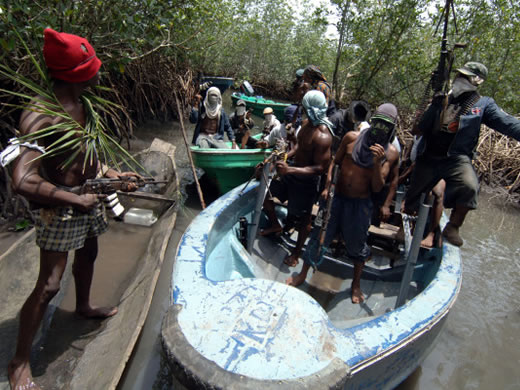London think-tank, Chatham House, has reported Nigeria’s economy may be heading for harder times, as it loses over N5.724 trillion annually to oil theft, fraud and piracy in the country’s oil industry.
Quoting the report, the United States’ Deputy Ambassador to the United Nations, UN, Ms. Michele Sison, put the overall damages incurred by Nigeria’s oil industry at about $1.5 billion each month, translating to N5.724 trillion annually.
According to the ambassador, the report revealed that the country is currently losing 400,000 barrels of crude daily to pirates in the Gulf of Guinea, depressed oil prices, rampant corruption, and pipeline vandalism, the equivalent to the entire daily export capacity of the country’s Forcados terminal.
She stated that attempts by local governments and the U.N. to put a stop to piracy have met with some success, but the practice continues -shifting location and adapting to new security measures.
As such, the U.N. Security Council is calling for a comprehensive framework of measures aimed at eradicating it. According to the U.N., piracy has increased at an alarming rate in the Gulf of Guinea since 2014.
“In the first quarter of this year alone, there were six recorded pirate attacks in the Gulf of Guinea, and six attempted attacks. Nine of those were off the coast of Nigeria, while one was off the coast of Côte d’Ivoire, and two were within the territorial waters of the Democratic Republic of the Congo.
” Last year, there were 100 similar incidents in the Gulf of Guinea, the U.K.’s ambassador to the U.N., Mr. Peter Wilson, added. Last Monday the United States cautioned that piracy and maritime crime is on the rise in the Gulf of Guinea, noting that there have been 32 attacks off the Nigerian coast so far this year.
Failed operations Sison blamed ineffective government operations, weak rule of law and inadequate maritime law enforcement all contributed to the increase in piracy in the Gulf of Guinea, a major route for oil supplies shipped around the world.
She added that dealing with pirates required an international effort, and particularly a coordinated effort by those countries near the Gulf of Guinea.
“There isn’t much Nigeria can do on its own. Without a major overhaul of intelligence sharing and local law enforcement collaboration and training, the piracy scourge will continue to worsen.” The dip In March, Nigeria pumped 1.677 million barrels of crude, which was a decline on the previous months 1.744 million.
According to a Financial Times analysis, the decline is set to continue over the coming years, largely because the reforms at the NNPC, pledged by President Muhammadu Buhari to tackle long-time corruption and inefficiency, have so far not yielded any actual results.
In addition to dealing with corruption as part of the reforms, the President plans to change the terms of the production-sharing agreements it has with foreign oil companies operating in the country. Oil majors with a Nigerian presence said such a move could deter investments and ultimately have a negative effect on oil revenues.
Send your news, press releases/articles to info@primetimereporters.com. Also, follow us on Twitter @reportersinfo and on Facebook at facebook.com/primetimereporters or call the editor on 07030661526.

